Wife of Declaration of Independence Signer James Wilson
Justice James Wilson
The official Supreme Court portrait
Rachael Bird was born in 1750, the youngest daughter of William Bird of Bucks County, Pennsylvania, proprietor of the fine country seat and iron works on the Schuylkill River, known as Birdsborough. Through her mother, Brigetta Huling Bird, Rachel was a descendant of the Marquis Jean Paul Frederick de Hulingues, a Huguenot nobleman attached to the court of Henry of Navarre. Rachel’s brother, Mark Bird, married Mary Ross, the sister of George Ross, a future signer of the Declaration of Independence.
James Wilson was born on September 14, 1742, in Carskerdo, Scotland, the son of William Wilson and Aleson Lansdale Wilson. His father was a respectable farmer, living a healthy life but a hard one. Methods of husbandry were crude, there was little variety of produce, even fertile soil was not constituted to yield lavish crops, and after the rent had been met there could be but little to lay by. Dwellings were small and bare, plenishings were meager and rude. Nevertheless, a boy with intelligence and grit could find opportunity to furnish his mind and train his faculties.
At the age of 15, James earned a scholarship to the United College of St. Salvator and St. Leonard at the University of St. Andrews. While his studies there were centered primarily on preparing him for a life in the church, later writings reveal that he entertained much broader interests, including classical governments and philosophy. He received a degree from St. Andrews in 1762. Wilson then studied briefly at the Universities of Edinburgh and Glasgow. He attended a surprising number of schools, and never attained a degree.
In 1765, Wilson embarked upon his journey across the Atlantic. He arrived in New York in the midst of the controversy over the Stamp Act, which levied a tax on all documents involved in the internal commerce and business of the colonies.
Moving to Philadelphia, Wilson taught Latin at the College of Philadelphia, a school only recently founded with the help of Benjamin Franklin, and which was to become the University of Pennsylvania. The trustees there were impressed with his classical scholarship and the all-around quality of his educational attainments.
After only a few months, Wilson found an opening as a student of the law in the office of John Dickinson, a leading lawyer and politician who would later play an important part in opposing the Declaration of Independence. Applying himself wholeheartedly to the study of law, Wilson was admitted to the Pennsylvania Bar in 1767.
In 1768, the year after his admission to the Philadelphia bar, Wilson set up practice at Reading, Pennsylvania. He also found time to lecture on English Literature at the College of Philadelphia, which had awarded him an honorary master of arts degree in 1766.
On borrowed capital, Wilson also began to speculate in land, which became a life-long fascination. He had bought a small farm near Carlisle, and dabbled in land speculation in New York and Pennsylvania.
In the aftermath of the Stamp Tax dispute , Wilson studied the legal relationship between the British Parliament and the Colonies, and the British King and the Colonies. Wilson began with the assumption that Acts of Parliament had at least some binding effect on the Colonies, but he was amazed to discover that none existed on any basis.
When he was only 26 years old, his thoughts on the developing struggle with Great Britain were years ahead of those of most of his contemporaries. The fact that it was first conceived in 1768 is testimony to Wilson’s maturity of mind. Like Wilson, who was educated in an environment familiar with the Scottish Enlightenment, a number of the most influential founding fathers had also been exposed to these ideas of Scottish origin, including Thomas Jefferson, James Madison, Richard Henry Lee, and Alexander Hamilton.
He titled this study, Considerations on the Nature and Effect of the Legislative Authority of the British Parliament, which would become an important resource as the colonies moved toward independence. Wilson’s pamphlet circulated widely in England and America. In it, Wilson argues that the Parliament had no authority to pass laws for the colonies, because the colonies had no representation in the Parliament. He did conclude, however, that the colonists, as subjects of the king, owed allegiance to the Crown equal with the subjects in England, and were entitled to the same rights and privileges, which the colonists were not receiving.
Wilson’s conclusion strongly supported the approach later taken in the Declaration of Independence in charging the King with injurious conduct. The language he used in adopting the doctrine of popular sovereignty and natural rights foreshadowed the content of the Declaration of Independence:
All men are, by nature, equal and free: no one has a right to any authority over another without his consent: all lawful government is founded on the consent of those who are subject to it: such consent was given with a view to endure and to increase the happiness of the governed, above what they could enjoy in an independent and unconnected state of nature. The consequence is that the happiness of the society is the first law of every government.
In 1770, Wilson moved to the Scotch-Irish settlement of Carlisle. He specialized in land law and built up a broad clientele in Cumberland County and seven neighboring counties. His office was very successful and he earned a small fortune in a few short years.
Rachel Bird married James Wilson on November 11, 1770. They had six children: Mary, William, Bird, James, Emily, and Charles.
By 1774, James Wilson was well-known and respected; in July of that year, Wilson was made head of the Committee of Correspondence at Carlisle, and was elected to the first Provincial Conference at Philadelphia. In January 1775, he was a member of the Convention of the Province. At that time, he was a Whig and on the extreme wing of that party; his future career would see him become steadily more conservative.
In May, 1775, Wilson was elected to the Continental Congress. Hard working with an impressive figure well over six feet tall, he served on several important committees, and urged careful consideration as the colonies moved towards independence.
A year later, after the two day debate over Richard Henry Lee’s resolution for independence on June 7, 1776, seven colonies were in favor of independence, but five, including Pennsylvania, were against it. Pennsylvania was divided on the issue of independence, and Wilson refused to vote against the will of his constituents in Cumberland County, PA.
Many members of the Congress felt that Wilson was hypocritical to have argued so forcefully and so long for Independence, only to vote against it when the occasion came. With the support of three other members who were sympathetic to his position, Wilson managed to delay the vote for independence for three weeks, so that he could consult with people back home.
On July 2, 1776, James Wilson, Benjamin Franklin, and John Morton voted for independence, and signed the Declaration of Independence with the other delegates on August 2, 1776.
![]()
James Wilson’s Signature
On the Declaration of Independence
Following the signing of the Declaration, Pennsylvania and the other states began writing state constitutions. Wilson was opposed to the Pennsylvania constitution because it called for a unicameral (one) legislative body, and he believed that its lack of a system of checks and balances would lead to mob rule. His fellow delegates, believing that he had abandoned the patriot cause for a more conservative position, forced his removal from Congress in September 1777.
To avoid the clamor among his frontier constituents, he spent the winter of 1777-78 in Annapolis, Maryland, practicing law, but this move only intensified the scandal, and he was charged with abandoning his state.
In 1778, Wilson moved his family to Philadelphia, where he began to circulate among conservative groups and increased his business interests as well as his land speculation. He closely identified with aristocratic and conservative groups, and took a position as Advocate General for France in America, dealing with commercial and maritime matters.
As the Revolutionary War progressed, many economic hardships were encountered. In 1779, there were food shortages, and rampant inflation made Continental currency worthless. In May 1779, the Philadelphia militia ordered that food prices in the city be fixed.
Soldiers searched warehouses, arrested suspected Tories, and accused some of the city’s merchants of engrossing – hoarding goods in a time of shortage in order to drive up prices. One of these merchants was James Wilson. His popularity continued to wane, and his credibility came under fire when he began counseling British Loyalists on legal matters.
Mob riots occurred in Philadelphia in 1779 against profiteers, loyalists, and their sympathizers. Learning that they would be targets, Wilson and thirty-five supporters barricaded themselves in Wilson’s home.
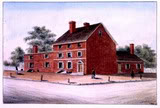
James and Rachel Wilson House
Benjamin Evans, Artist
Third and Walnut Streets, Philadelphia
As it looked in 1779
On October 4, 1779, militiamen and radical Constitutionalists came to tar and feather Wilson and his guests and ride them out of town. One of the radicals, Philadelphia artist Charles Willson Peale, made an unsuccessful attempt to persuade the mob to disperse. But they pushed by him to break down the doors of Wilson’s home, which the citizens dubbed Fort Wilson.
Gunshots were fired and several people on both sides were killed, and many were injured. Only the arrival of the city’s soldiers prevented the attack from succeeding, and Wilson and his friends were escorted to safety. The shock of the situation cooled sentiments, and all involved were pardoned and released.
Although Wilson worked to raise money and support for the Revolution in Philadelphia, he was also driven to accumulate wealth. In 1779, he accepted a position as the advocate general for France in America. In 1783, the King of France rewarded him for his services in the amount of 10,000 livres, a substantial sum.
Rachael Bird Wilson died in 1786.
The Constitutional Convention
By 1787, a number of the Founding Fathers, including George Washington, Alexander Hamilton, James Madison and James Wilson, recognized the limitations and weaknesses of the Articles of Confederation. The states called for a Constitutional Convention, which began meeting in May 1787, to amend and update the Articles. Instead, a whole new vision of government emerged.
Wilson reached the apex of his career as a delegate to the Constitutional Convention, where his influence was probably second only to that of James Madison. Rarely missing a session, he applied his excellent knowledge of political theory to convention problems. Wilson addressed the Convention 168 times. Only Gouverneur Morris delivered more speeches.
On May 29, 1787, Edmund Randolph, on behalf of the Virginia delegation, submitted to the convention fifteen propositions as a plan of government. Despite the fact that the delegates were limited by the instructions of their State legislatures to a revision of the Articles, Virginia had really recommended a new instrument of government.
On July 24, 1787, a Committee of Detail – John Rutledge of South Carolina, Edmund Randolph of Virginia, Nathaniel Gorham of Massachusetts, Oliver Ellsworth of Connecticut, and James Wilson of Pennsylvania – were elected to draft a detailed constitution embodying the fundamental principles that had thus far been approved. The Convention adjourned from July 26 to August 6 to await the report of this committee. Wilson’s most important contribution as a Founding Father was his work in framing the new federal Constitution.
From August 6 to September 10, the report of the committee of detail was discussed, section-by-section, and clause-by-clause. Details were attended to, further compromises were agreed upon. James Wilson, with the support of Alexander Hamilton, argued that the Senate should be elected directly by the people. This proved one of the most contentious issues in the Convention and nearly led to its demise. A compromise was reached; there would be two senators and two electors for each state. Election of senators for over a century was made by the state legislatures rather than the people, but was finally rectified in 1913 by the XVII Amendment.
On September 8, 1787, a final drafting committee – William Samuel Johnson of Connecticut, Alexander Hamilton of New York, Gouverneur Morris of Pennsylvania, James Madison of Virginia and Rufus King of Massachusetts – was appointed “to revise the style of and arrange the articles which had been agreed to by the house.” Gouverneur Morris wrote the final version of the Constitution, which closely followed the form and content of Wilson’s draft, including the immortal beginning, We the people….
On Wednesday, September 12, the report of the drafting committee was ordered printed for the convenience of the delegates. For three days, the Convention compared this report with the proceedings of the Convention. The Constitution was then ordered engrossed on Saturday, September 15.
The Convention met on September 17, 1787, for its final session. Several of the delegates were disappointed in the result. A few deemed the new Constitution a mere makeshift, a series of unfortunate compromises. Some delegates left before the signing ceremony, and three of those remaining refused to sign: Edmund Randolph and George Mason of Virginia, and Elbridge Gerry of Massachusetts.
Of the thirty-nine who signed, probably no one was completely satisfied, and their views were ably summed up by Benjamin Franklin, who said, “There are several parts of this Constitution which I do not at present approve, but I am not sure I shall never approve them.” He would accept the Constitution, however, “because I expect no better, and because I am not sure that it is not the best.” Six others signed later.
James Wilson was one of only six Founding Fathers who signed both the Declaration of Independence and the Constitution.
Though not in agreement with all parts of the final, necessarily compromised Constitution, Wilson worked hard for its adoption, leading Pennsylvania at its ratification convention, to become the second state to accept the document.
His October 6, 1787, speech in the State House Yard has been seen as particularly important in setting the terms of the ratification debate, both locally and nationally. In particular, it focused on the fact that there would be a popularly-elected national government for the first time.
After Pennsylvania ratified the Constitution, anti-federalists in his old hometown of Carlisle took to the town square and burned James Wilson in effigy.
In 1789 and 1790, Wilson was the main author of Pennsylvania’s new constitution, which included a governor with limited veto power, a bicameral (two-house) legislature, and an independent judiciary. It was ratified in 1790.
In 1790, he became the college’s first law professor at the College of Philadelphia and founder of the Penn Law School. Wilson had come to see teaching as a means of gaining enduring recognition and to establish the foundation of the young nation’s legal system. The majority of his written works came from his lectures from there.
Wilson saw the power in the position of Chief Justice of the Supreme Court, and wrote to President Washington asking him to appoint him to that position, but Washington instead appointed him an Associate Justice in 1791. The first chief justice position was awarded to John Jay. Wilson did not achieve the success on the Supreme Court that his capabilities and experience promised. During his tenure, he was frequently criticized and barely escaped impeachment. For example, he tried to influence the enactment of legislation in Pennsylvania favorable to land speculators.
Meanwhile, his personal wealth, which had already suffered damage from the three years of tireless efforts to secure new constitutions for his nation and state, continued to deteriorate. His hasty land speculation in New York and Pennsylvania failed, and Wilson slipped into an indebtedness which would last the remainder of his life. He was increasingly under mental pressure as debt collectors began to pursue him and efforts were made to impeach him from the bench.
The remainder of his life was miserable. In the 1790s, Wilson’s career was marred by the difficulty he had reconciling a strong personal drive for wealth and power with public service. He made large speculative investments in land in western New York, Pennsylvania, and Georgia, where he attempted to import large numbers of Europeans to settle there. His finances were completely destroyed within a short time.
While in Boston in 1793, as a Justice of the Supreme Court, he met and married Hannah Gray, who was thirty years his junior, which gave rise to a scandal. She was younger even than some of Wilson’s children by his first wife, Rachel Bird Wilson. One child was born of this marriage, Henry, who died in infancy.
Wilson was able to consolidate his debt owed to the Bank of North America in 1794, and tried to elude his collectors, but his heavy debts became real liabilities with the onset of the Panic of 1796-1797. To avoid prosecution for non-payment of debts in 1797, he fled from Philadelphia to Burlington, New Jersey, where he was briefly imprisoned for a debt in Burlington, New Jersey, while still serving on the Supreme Court!
In 1798, Wilson went to North Carolina to escape other creditors. He arrived at Edenton, NC, in a state of acute mental stress and was taken into the home of James Iredell, a fellow Supreme Court justice. He was again briefly imprisoned. Later that year, Wilson suffered a bout of malaria, after which he complained of great mental fatigue and an inability to work any longer.
James Wilson died suddenly August 21, 1798 of a stroke the age of fifty-five at James Iredell’s home in Edenton, NC. Wilson was buried nearby at Hayes Plantation.
James Wilson was still a Supreme Court justice and a Penn law professor at the time of his death, but his reputation had sunk so low that his remains were not returned for burial in Philadelphia until 1906. In an elaborate and formal ceremony under the direction of President Theodore Roosevelt, Wilson’s casket was carried to Christ Churchyard and buried next to his Pennsylvania colleague, Benjamin Franklin. The ceremony included the appearance and tributes by many dignitaries.
A pre-eminent legal scholar, he was three times passed over for appointment as Chief Justice of the Supreme Court. One of the best educated and most energetic men of his time, he spent his last years as a debtor, hunted, in his words, “like a wild beast” by anxious creditors. James Wilson’s life was filled with contradictions, but it was also a life devoted to the law and to the new American republic.
James Wilson was described by fellow signer Benjamin Rush as:
An eminent lawyer, an enlightened statesman, a profound and accurate scholar. Mr. Wilson’s personal appearance made his eloquence even more impressive. He stood six feet tall with a large frame and erect bearing, and his fiery energy went into his declamations. Though his voice was not melodious, it was powerful., and his blue eyes gleamed through heavy spectacles rimmed in metal.
James Madison’s notes, released in 1840 after his death, revealed just how important and influential Wilson’s actions and opinions had been at the Constitutional Convention:
Mr. Wilson contended strenuously for drawing the most numerous branch of the legislature (the House of Representatives) immediately from the people. This was not only because of his conviction that no government could long subsist without the confidence of the people—especially a republican government—but also because he was for raising the federal pyramid to a considerable altitude, and for that reason wished to give it as broad a basis as possible. Wilson considered the election of the first branch by the people not only as the cornerstone, but as the foundation of the fabric.
Charles Page Smith, James Wilson’s biographer, suggests that we should mitigate our judgments of Wilson with mercy and praise:
If Wilson was eventually the victim of his ambition and of his greed, he was also the victim of his dreams. We are the legatees of his dream of a united democratic republic, secure under the law in the possession of human rights and dignity… If Wilson’s land dream was less noble, it was no less American and no less a part of the future. In Wilson, the spirit that could later be identified as American capitalism surged so strongly that it finally tore him asunder and utterly destroyed him.
SOURCES
James Wilson
Rachel Bird Wilson
James Wilson Timeline
James Wilson Biography
James Wilson (1742-1798)
Wikipedia: James Wilson
James Wilson: Pennsylvania
Explore Pennsylvania History
Justice James Wilson of Cumberland
Allen McLane’s Account of the Attack on “Fort Wilson”
Representative for Pennsylvania to the Continental Congress
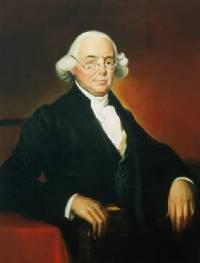
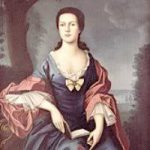
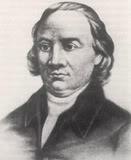
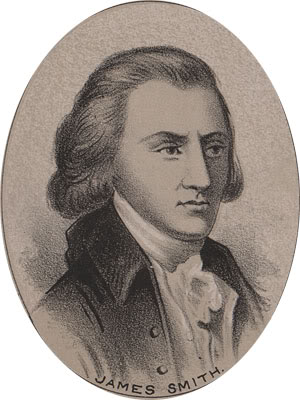

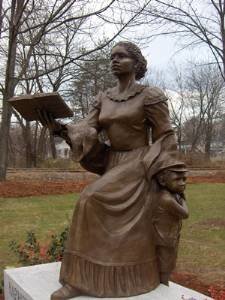
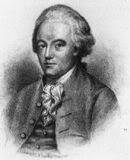
A more perfect union continues to exist for/in over 2 centuries since its inception in the minds of imperfect but sincere individuals who sought to ensure the endurance of America as the ideal concept of liberty exercised by its citizens.
James Wilson was married to my ancestor, Rachel Bird. Her brother was married to the sister of another signer, Ross, of the Declaration of Independence.
Sherry, My ancestor, too, is through Rachel Bird and James Wilson through their son William and his wife Nancy La Porte Layport in Newcomerstown, Ohio. William was sent by his father to look for land. Land speculation truly caught the eyes of all at the time. One of his sons was James Bird Wilson, married to Nancy Auld. One of their sons was William Hamilton Wilson married to Emeline Griffis (parents were David Griffis and Lydia Parkhurst) and one of their children was Lydia Ethel Wilson, my great grandmother. She was 16 when her Mother died. Been searching for a picture of Rachel. Have you seen one?